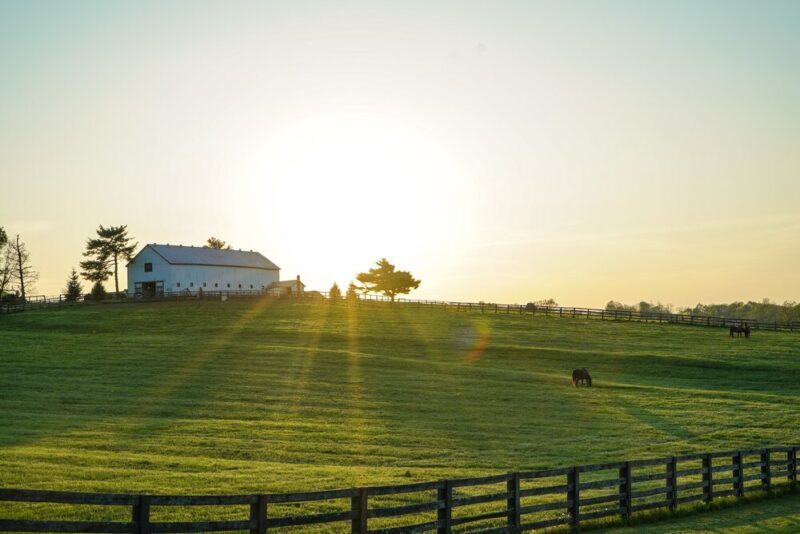Farm Insurance: Protecting Farmers During the Pandemic

Farm insurance will cover a wide array of matters in and around your farm. Some covered areas may include liability, farm property and buildings, as well as home and belongings. Moreover, farm insurance can fit virtually any type of farm.
Farm insurance is very adaptable, so you should be eligible for farm insurance. Sadly, the changes in food supply and demand that the pandemic has brought on have hit the agricultural industry very hard.
As such, farmers should obtain farm insurance to protect their interests during these precarious times. In addition, both personal home insurance and farm insurance will cover your liability exposures and private property.
However, there are some subtle differences between the two. For example, a conventional home insurance policy will usually cover the contents of secondary buildings (i.e., tool shed) and fencing. A typical farm insurance policy will cover buildings used for farming purposes as well as financial losses from damages or poor crop yields…..
Role of Farm Insurance During the Pandemic
Crop production has been affected by the pandemic by creating mandatory lockdowns. For example, harvesting vegetables and fruits tend to require many people who need to work quite close to one another.
Covid-19 has forced governments to enforce isolation orders and global travel restrictions. Sanitation and hygiene have become serious issues, and many farmers and other agricultural workers have become ill or have died due to Covid-19 complications.
The livelihood of farmers and their families has been drastically impacted due to the pandemic’s physical, psychological, logistical, and financial effects.
Farm insurance can help offset or mitigate some of the problems that the pandemic has created.
For example, it will provide stable income support. You will be protected by crop failure losses. You will be able to manage your price and yield risks properly. Minimal debts are yet another benefit.
By working with the ideal insurance company, you will be able to repay all of your loans even in the event of a significant crop failure. Yield protection is yet another benefit.
You will be protected in the event of production loss. Apart from this, you will also be provided with preventive replanting and planting security as well.
You will also be able to take advantage of the latest technological advances. Most insurance enterprises will work with agricultural platforms that utilize the Internet of Things to reduce farmers’ losses and improve farming practices.
You will be able to augment your crop production and learn more about the latest technological innovations in the industry. Farm insurance will also protect your farm from natural disaster losses.
Natural disasters are unpredictable and inevitable. Obtain peace of mind knowing that you will be protected when a natural disaster strikes. Your livestock and feed will also be protected when you obtain farm insurance.
Types of Farm Insurance
Farm liability insurance
It will prevent the loss of your farm due to a liability issue. Examples include a person injuring themselves while on your property, legal defense fees, hospital bills, and medical expenses.
Dwelling home protection insurance
This will protect you if your home is damaged or destroyed by a disaster, such as a fire or a windstorm.
Farm equipment insurance
Equipment insurance will protect your machinery, supplies, and your farm equipment, which can save you tens of thousands of dollars in the long run.
Barn insurance and outbuilding coverage
will cover any exterior buildings that are related to your farming enterprise, including, but not limited to, grain silos, sheds, barns, and garages.
Livestock, fencing, and hay insurance
will protect your produce and animals from disastrous weather events, accidental injuries, damage, theft, and other mishaps for peace of mind.
Business interruption and farm loss of income insurance
will compensate you if occasionally harsh weather, damage, theft, or accidental damage stops you from generating an income via your typical business activities.
As can be seen, there are many types of farm insurance that you can take advantage of to benefit you and your farming business.
Facts to Know Before Applying for Farm Insurance
First and foremost, you need to properly comprehend all the insurance policies and benefits available to you. This need to be fully aware of your rights and obligations while going over each policy.
You should also go over all of your documents to ensure that you are not missing any pertinent documentation before you apply. You also need to specify your requirement regarding the duration of the insurance policy.
Protect What Matters Most
Farm insurance is required to protect what matters most to you. Your farm-related liabilities and investments will need to be protected against anything that may come your way, including a pandemic.
Farm insurance will protect you against a plethora of risks such as lawsuits and claims that resulted from property damages that were caused on your farm, as well as personal injuries.
You will also be protected in the event of abrupt losses on your produce and livestock during random temperature drops, fires, pestilence, severe weather issues and other unpredictable and devastating hardships.
In addition, commercial farming may also necessitate a different type of policy in some cases. Generating an income and hobby farming simultaneously may require additional coverage.
For example, if you decide to start selling some of your produce at a local farmers market, taking out a hobby farm policy is strongly recommended. You may also require specialized coverage for livestock and growing crops.
You may also require equine insurance if you own thoroughbreds or horses. What’s more, your farm liability insurance may not cover custom farming.
Also Read: How Mortgage Protection Insurance Works
Before you choose the ideal farm insurance policy and coverage for your farming business, there are many factors to consider. Please speak to a financial advisor or insurance broker if you require additional help or guidance.

Pranab Bhandari is an Editor of the Financial Blog “Financebuzz”. Apart from writing informative financial articles for his blog, he is a regular contributor to many national and international publications namely Tweak Your Biz, Growth Rocks ETC.








